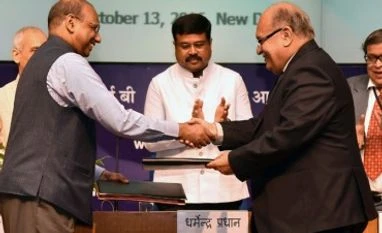PetroFed, an apex society of entities in the hydrocarbon sector, has signed a memorandum of understanding (MoU) with TERI (The Energy and Resources Institute) to undertake study on ‘Climate change risks: Preparedness for oil & gas sector’. The study is expected to provide a missing link between the policy and the practice in the hydrocarbon sector.
With the 2015 Paris Climate agreement (also known as COP 21) coming enter into force on November 4, 2016, it is important for the country to know the effects of greenhouse gases and ways to control them. Though India is a low per capita energy consumer at present, its energy consumption is bound to increase as the country is moving towards double-digit growth rate. The Government is focusing on gas, renewable energy and bio-energy to meet its requirements. It is important to understand the implications of various energy sources and to develop an Indian model for the nation’s energy sector.
Lauding the initiative of PetroFed and TERI, Dharmendra Pradhan, Minister of State for Petroleum & Natural Gas, said, “This study will provide important inputs for future strategy on oil and gas infrastructure development. The study will also provide a comprehensive analysis of threats posed by climate change to oil & gas sector and will provide a way forward to tackle the challenges posed by climate change.”
The study will suggest suitable measures for the oil & gas sector to achieve India’s INDC (Intended Nationally Determined Contributions) target of reducing carbon dioxide emission intensity of GDP by 33-35 per cent below the levels in 2005 by 2030. The study would further highlight how the global market and technological options are likely to change as a result of global climate policy measures; and how the 1.5 degree and 2 degree scenarios of global warming are likely to affect the infrastructure and operations in different climatic zones of India.
The share of gas in the Indian energy basket is 6.5 to 7 per cent while the world average is 24 per cent. India aspires to take the share of gas to 15 per cent in the next 3 to 5 years so as to have a new gas based economy. The Minister said the country will zoom from BS IV to BS VI by 2020 so as to have clean fuel.
)